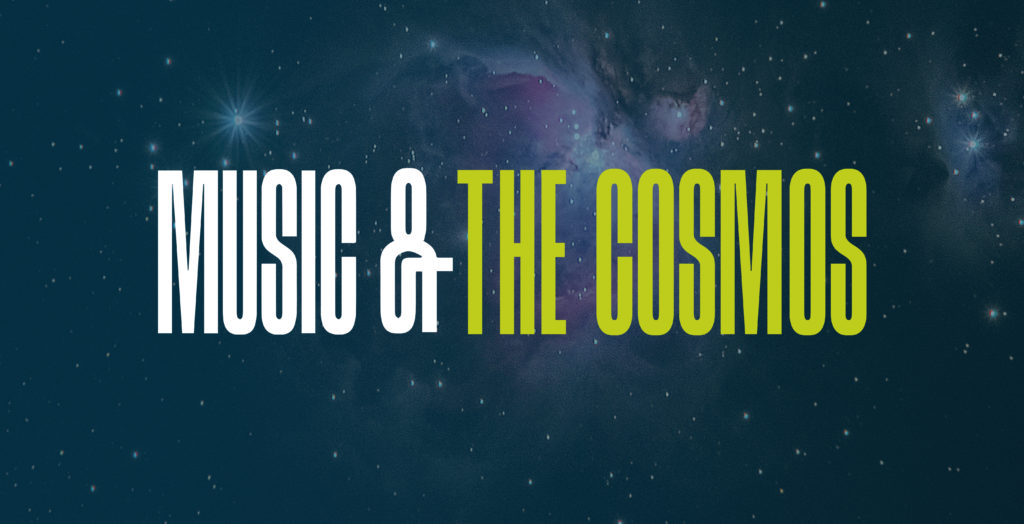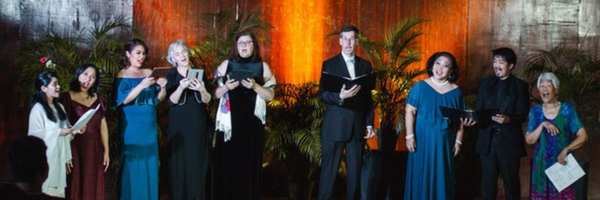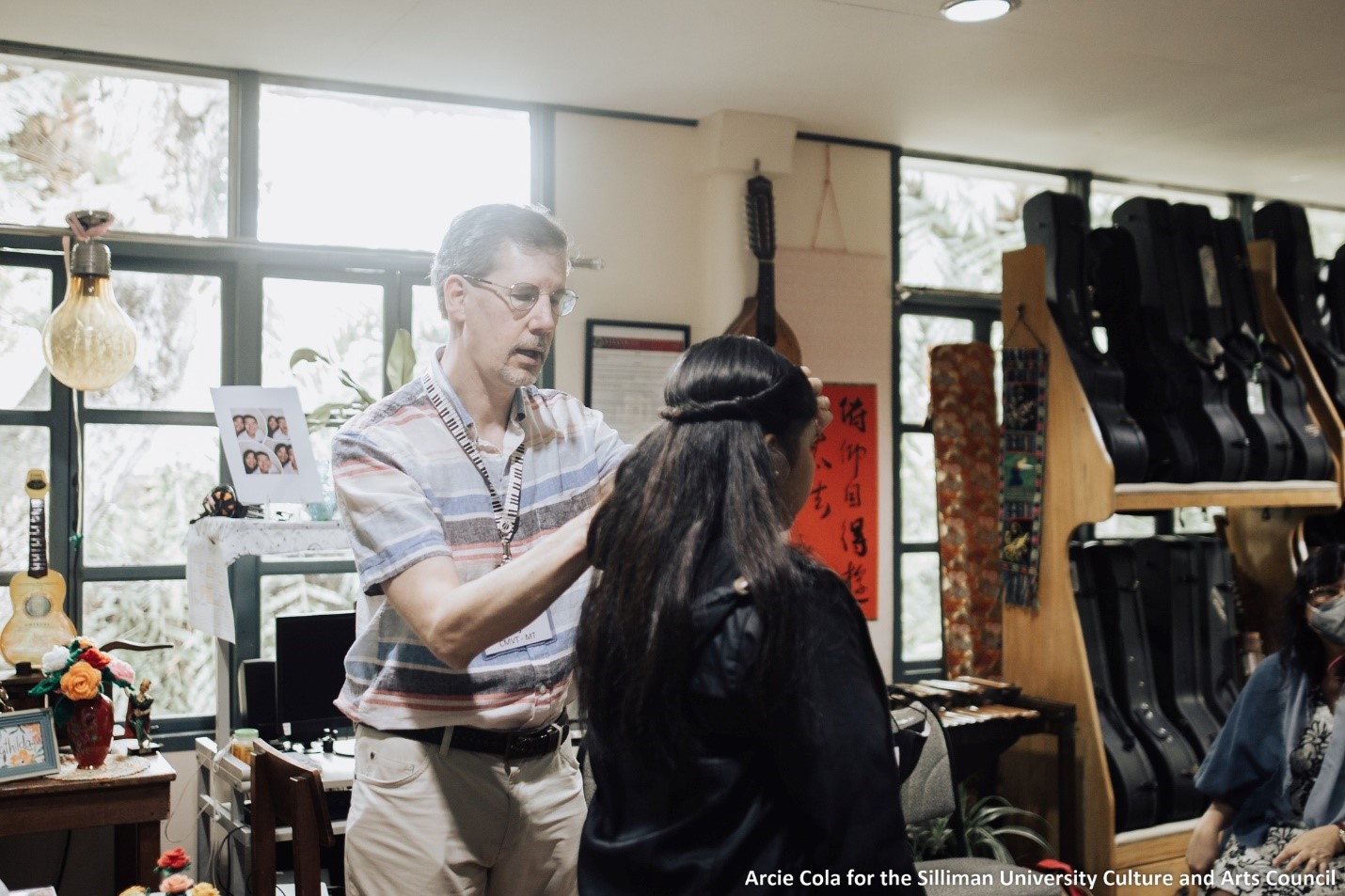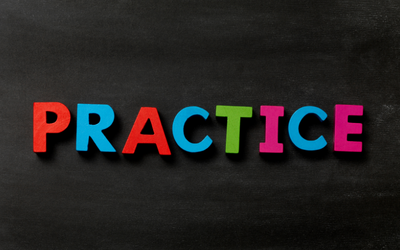
Concord Conservatory presents Music & the Cosmos
Concert and lecture on Friday, October 21, 2022, at 7:30 pm
For centuries, composers have found inspiration in the vastness of the universe. The intersection of music with the cosmos challenges our conventional thinking of what music can be, where it can occur, how it is constructed, and how it can connect us to nature.
Our special guest speakers, Observational Astrophysicist Erin Kara of MIT, and Brad Wells of the Grammy Award-winning Roomful of Teeth will present on the topics of the sonification of black holes and understanding the concept of space and its relationship to sound.
The concert will feature chamber music works of Mozart, John Cage, and Urmas Sisask performed by Concord Conservatory faculty, flutist Anthea Kechley, violinist Nicole Parks, cellist Stephen Marotto, and pianist Keun Young Sun.
Purchase tickets in advance or pay at the door for this event.
Your October Listening Project Playlist!
In conjunction with our upcoming concert and lecture—Music & The Cosmos, this month’s Listening Project Playlist features music inspired by space and cosmology.
Remember to use your Listening Journal for additional thought-provoking questions to think about while listening to the selections. It’s a great way to start insightful conversations with your family, friends, or music instructor!
Take these shortcuts to your October playlist: Spotify
What do Fidelity, Raytheon, and State Street have in common?
They have matching gift programs.
If your employer matches tax-deductible charitable contributions, you can double the impact of your gift to CCM! Concord Conservatory recognizes and thanks to both donor and employer for this generous gesture!
Won’t you please consider giving the gift of music today?
Are you a CCM friend yet?
Join us on Instagram and Facebook to be the first to learn CCM news and more! See what music videos we like, photos we post, practice tips and articles we suggest, and new music in the music world. Be sure to bookmark the CCM Blog to never miss a new post.

Teaching someone how to sing isn’t as straightforward as you may think. Just because a voice instructor knows the proper way to sing – maintaining the correct posture and breathing techniques – doesn’t mean they know the best way to instruct students, which is pedagogy. Receiving pedagogy training from professional instructors like CCM faculty member Jay Lane helps create and develop skillful teachers.
Jay earned both a B.A. in music and Ph.D. in musicology from Yale University. He is a Certified McClosky Voice Technician & Master Teacher from the McClosky Institute of Voice. With an impressive academic background along with extensive hands-on experience, Jay was the ideal instructor to go overseas and teach the McClosky Institute of Voice’s program.
But why is it important to learn pedagogy and its best practices?
Instructors learn how to identify students’ needs and learning styles, enabling them to tailor their instruction for individual students and be much more effective. Instructors gain knowledge in how to empower and inspire their students while transforming them into happy and confident musicians.
The McClosky Institute of Voice
Jay first learned of the McClosky Institute when he sought extra voice training. He jumped into their introductory class and then their teacher training program. Jay became a Certified McClosky Voice Technician and, after progressing even further in his studies, a Master Teacher at the Institute—certified to teach the upper-level courses offered to established voice teachers.
Jay explained, “The McClosky Technique was one of the first vocal techniques to be based largely on anatomy, physiology, and medical science. When I was first learning the technique, I was impressed that the teachers could always explain what they did based on their knowledge of how the body works.
The goal of the McClosky Technique is functional efficiency: coordinating the different parts of the vocal mechanism so that, whether in song or in speech, each part of the body is doing its proper job, with little or no effort wasted.
We teach a series of exercises to release counter-productive tensions, a stance that promotes efficient, easy breathing, and an easy onset of tone.”
Taking his Training to Far-Flung Places
In 2020 and again in 2022, Jay was honored to be one of the faculty members invited to teach for the Institute’s first overseas certification classes, which were offered in Manila (2020) at St. Luke’s Hospital, and in Dumaguete (2022) at Silliman University.
Institute’s first overseas certification classes, which were offered in Manila (2020) at St. Luke’s Hospital, and in Dumaguete (2022) at Silliman University.
Jay said, “Our Philippine hosts took exceptional care of us. We all worked extremely hard, teaching six new voice instructors, leading an introductory class for twenty-four participants, and then helping to run a simplified program for local schoolteachers; we sang in a faculty recital, as well! Thank goodness there was also time for rest and for sightseeing. We enjoyed the beautiful scenery and the friendly, open-hearted people. We found our students to be quite easy to teach—singing is highly valued in the Philippines, as is education in general!” This past summer, Jay traveled to Silliman University in the Philippines to again teach voice and vocal pedagogy in a program offered by the McClosky Institute.

Jay is uniquely equipped to teach vocal technique to both professional voice instructors as well as to students. He can help instructors teach how to improve vocal sound, stamina, and longevity, or how to help end vocal pain. And he fosters these skills in students all the time when he teaches his own private lesson CCM students or the Singing with Parkinson’s Chorus.

Once again, October is Practice for Pizza Month at CCM! We encourage our students to take the challenge and practice for 30 days in the month. Our Practice Challenges not only develop beneficial practice habits, but they allow students to permanently attain valuable skills by practicing every day.
We encourage mistakes along the way too
Practicing should not result in stress-inducing sessions. CCM instructors encourage effective practicing and making a few mistakes along the way. Making mistakes may help musicians overcome problem spots in a piece.
Practice does not mean that every piece played should be impeccable and flawless.
To prove our point, The BulletProof Musician Noa Kageyama explains why ‘Perfect Practice’ should not be the end all-goal. He says, “But then there are times when this no-mistakes-allowed definition of perfect practice makes us afraid to try a new way of doing things – something that might help us take our playing to a new level in the long term but make us sound worse in the short term.
Or times when we are afraid to stretch ourselves. Reluctant to explore the edges of our current technical ability to see what cool things we might be capable of.” He explains further in, “The Problem with “Perfect” Practice.”
Ensure success by forming good habits
While it is okay to mistakes while practicing – that’s a good thing – students need to beware of creating bad practicing habits that linger and affect their playing. Perpetual bad practicing habits can be hard to break, but not impossible. It just takes dedication and awareness.
“Many people find it difficult to break bad habits because they’ve been practicing them for a long time. The bad habit may have become entrenched and difficult to break. To break a bad habit, you need to practice a new, good habit until it becomes automatic. The “practice makes permanent” principle is essential for making this happen.” (Alden Mills)
Feeding our students with pizza and skills on how to practice
Originally published in November of 2016—we share with you an article that emphasizes the importance of frequent good practice and excellent enduring outcomes.
From Opus November 2016
The power of pizza is a force to be reckoned with: That may be one of the lessons learned from October’s Practice for Pizza Month, but it will not be the only one. On November 2, students who met the challenge to practice their instruments 30 days in October will celebrate their success with a pizza dinner at CCM. For most students it wasn’t easy, which is all the more reason to celebrate.
Emma Peacock practiced her piano dutifully all month, which she says was “a very hard goal.” On the upside: “You get good at a lot of songs,” says the 8- year-old. The most challenging aspect? “Remembering to practice every day,” she says. But the road to Emma’s heart is clearly paved with pizza because she says the reward kept her on task: “I think I am more willing to practice because I know something good will happen,” she says. (The good thing being pizza, of course.) And somewhere in October, she says she learned that “if you practice every day, you can get a lot better.”
The goal of the exercise is to support both students and parents, to see the payoffs of regular practice and learn how to encourage the student to get there. For many students, like Emma, the challenge calendar is an important discovery: “It seems to provide Emma a great sense of accomplishment, seeing the days crossed off,” says Emma’s mother, Carol Harris. “More importantly, she is in the habit of playing every day and hates the thought of missing a day.”
and learn how to encourage the student to get there. For many students, like Emma, the challenge calendar is an important discovery: “It seems to provide Emma a great sense of accomplishment, seeing the days crossed off,” says Emma’s mother, Carol Harris. “More importantly, she is in the habit of playing every day and hates the thought of missing a day.”
We hope you all transition into November with newfound confidence and insight, maybe some new tunes under your belt, and at least an idea of what motivates your student. For Emma Peacock there is no question: “I think we should have pizza challenges more often,” she says. Pizza mission accomplished.
Back to the present
Still dedicated to studying music, Emma continues to take piano lessons with Kitty Cheung-Evans and along the way added saxophone lessons with Tsuyoshi Honjo.
Years of practicing has paid off for Emma and continues to do so. As Kitty says, “She loves all kinds of music. From singing in a church choir, playing saxophone in a band, and taking piano lessons. Because she has such great focus in her lessons, Emma can make quick adjustments when playing. She’s able to tackle each piece that interests her. She’s so outgoing that I like to pair her up with younger students for recitals. They enjoy Emma’s exuberant energy and become less afraid to perform at recitals.”
Keep up the splendid work Emma!